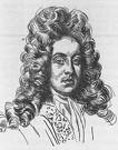Henry Purcell
(1659-1695)
 As one of the originators of English Baroque Music, Henry Purcell has often been called England’s greatest composer. Focusing largely on vocal/choral music, Purcell wrote for both the church and stage, including one opera, Dido and Aeneas. He was likely born in the Westminster area of Central London, the middle child of three sons. His father, Henry Purcell, Sr., was a gentleman of the Chapel Royal, and sang at the coronation of King Charles II. The younger Purcell followed his father’s footsteps in the Chapel Royal and dedicated much of his remaining years in their service as an organist, singer, and composer. As a youth, he attended Westminster School studying under the tutelage of Dr. John Blow. At the age of 22, Purcell’s emerging musical virtuosity was held in such high regard that Dr. Blow abdicated his position as organist of Westminster Abbey to his young pupil, who in turn, held the position for the rest of his life. Twelve Sonatas, Purcell’s first printed work, was published in 1683, and was followed with a concentrated focus in scared music, including landmark anthems I Was Glad, My Heart is Intiding, and O Sing Unto the Lord. The uniqueness of Purcell’s music stems from his ability to weave a distinctly English counterpoint with the more expressive influence of French and Italian music. In 1687, a fruitful collaboration began with prominent poet John Dryden. Together, the two created such stage works as Tyrannick Love, Amphitryon, and the widely regarding theatrical and musical masterpiece, King Arthur. 1692’s The Fairy-Queen (a retelling of Shakespeare’s A Midsummer Night’s Dream) has been described as a prime example of the composer’s “pungent” English style of Baroque counterpoint. Further ground was broken with 1693’s Te Deum and Jubilate, written in honor of St. Cecila’s Day, and was the first of its kind by an English composer with orchestral accompaniment. In the wake of the death of Queen Mary II, Purcell composed an anthem and two elegies. Known as Music for the Funeral of Queen Mary, it was sadly performed ten months later at his own funeral following his sudden death at the age of 36. Purcell is buried near the organ he played for so many years of his adult life at Westminster Abbey in London, England.
As one of the originators of English Baroque Music, Henry Purcell has often been called England’s greatest composer. Focusing largely on vocal/choral music, Purcell wrote for both the church and stage, including one opera, Dido and Aeneas. He was likely born in the Westminster area of Central London, the middle child of three sons. His father, Henry Purcell, Sr., was a gentleman of the Chapel Royal, and sang at the coronation of King Charles II. The younger Purcell followed his father’s footsteps in the Chapel Royal and dedicated much of his remaining years in their service as an organist, singer, and composer. As a youth, he attended Westminster School studying under the tutelage of Dr. John Blow. At the age of 22, Purcell’s emerging musical virtuosity was held in such high regard that Dr. Blow abdicated his position as organist of Westminster Abbey to his young pupil, who in turn, held the position for the rest of his life. Twelve Sonatas, Purcell’s first printed work, was published in 1683, and was followed with a concentrated focus in scared music, including landmark anthems I Was Glad, My Heart is Intiding, and O Sing Unto the Lord. The uniqueness of Purcell’s music stems from his ability to weave a distinctly English counterpoint with the more expressive influence of French and Italian music. In 1687, a fruitful collaboration began with prominent poet John Dryden. Together, the two created such stage works as Tyrannick Love, Amphitryon, and the widely regarding theatrical and musical masterpiece, King Arthur. 1692’s The Fairy-Queen (a retelling of Shakespeare’s A Midsummer Night’s Dream) has been described as a prime example of the composer’s “pungent” English style of Baroque counterpoint. Further ground was broken with 1693’s Te Deum and Jubilate, written in honor of St. Cecila’s Day, and was the first of its kind by an English composer with orchestral accompaniment. In the wake of the death of Queen Mary II, Purcell composed an anthem and two elegies. Known as Music for the Funeral of Queen Mary, it was sadly performed ten months later at his own funeral following his sudden death at the age of 36. Purcell is buried near the organ he played for so many years of his adult life at Westminster Abbey in London, England.
Click below to view Henry Purcell titles:
t7t3l0uhl8|0010C39D6D07|DetailContent|contenttext|73BDF4AD-0815-40E4-882D-42CBA4CAB0DC
<